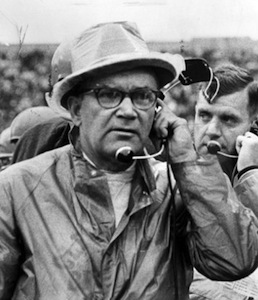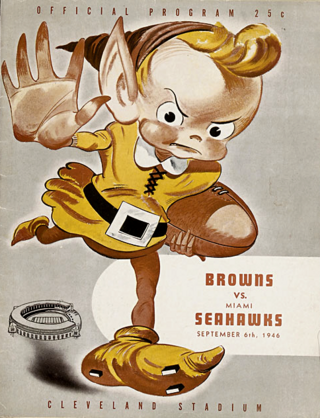Related Research Articles

The American Football Conference (AFC) is one of the two conferences of the National Football League (NFL), the highest professional level of American football in the United States. The AFC and its counterpart, the National Football Conference (NFC), each contain 16 teams with 4 divisions. Both conferences were created as part of the 1970 merger between the National Football League, and the American Football League (AFL). All ten of the AFL teams, and three NFL teams, became members of the new AFC, with the remaining thirteen NFL teams forming the NFC. A series of league expansions and division realignments have occurred since the merger, thus making the current total of 16 teams in each conference. The current AFC champions are the Kansas City Chiefs, who defeated the Baltimore Ravens in the 2023 season's AFC Championship Game for their fourth conference championship and went on to win Super Bowl LVIII against the San Francisco 49ers

The Cincinnati Bengals are a professional American football team based in Cincinnati. The Bengals compete in the National Football League (NFL) as a member club of the league's American Football Conference (AFC) North division. The club's home games are held in downtown Cincinnati at Paycor Stadium.

Paul Eugene Brown was an American football coach and executive in the All-America Football Conference (AAFC) and National Football League (NFL). Brown was both the co-founder and first coach of the Cleveland Browns, a team named after him, and later co-founded the Cincinnati Bengals. His teams won seven league championships in a professional coaching career spanning 25 seasons.
The American Football Conference – Northern Division or AFC North is one of the four divisions of the American Football Conference (AFC) in the National Football League (NFL). The division was created after the restructuring of the 2002 NFL season when the league realigned divisions after expanding to 32 teams. The division consists of the Baltimore Ravens, Cincinnati Bengals, Cleveland Browns, and Pittsburgh Steelers. This is the only division in the NFL in which no member team has hosted a Super Bowl in their stadiums. The division, however, has won eight Super Bowl titles in total.
Nicholas Leonard Skorich was an American football player and coach.

Blanton Long Collier was an American football head coach who coached at the University of Kentucky between 1954 and 1961 and for the Cleveland Browns in the National Football League (NFL) between 1963 and 1970. His 1964 Browns team won the NFL championship and remains the second-most recent Cleveland professional sports team to win a title.
The 1969 NFL Championship Game was the 37th and final championship game prior to the AFL–NFL merger, played January 4, 1970, at Metropolitan Stadium in Bloomington, Minnesota, a suburb south of Minneapolis. The winner of the game earned a berth in Super Bowl IV in New Orleans against the champion of the American Football League.

The Cincinnati Bengals are a professional football franchise in the National Football League. Since starting off as an expansion franchise in the American Football League in 1968, they have appeared in three Super Bowls, but lost all three times, twice to the San Francisco 49ers and once to the Los Angeles Rams.

The history of the Cleveland Browns American football team began in 1944 when taxi-cab magnate Arthur B. "Mickey" McBride secured a Cleveland, Ohio, franchise in the newly formed All-America Football Conference (AAFC). Paul Brown, who coach Bill Walsh once called the "father of modern football", was the team's namesake and first coach. From the beginning of play in 1946 at Cleveland Municipal Stadium, the Cleveland Browns were a great success. Cleveland won each of the AAFC's four championship games before the league dissolved in 1949. The team then moved to the more established National Football League (NFL), where it continued to dominate. Between 1950 and 1955, Cleveland reached the NFL championship game every year, winning three times.
The 1995 Cleveland Browns season was the team's 50th season overall and 46th in the National Football League. It ultimately became their final NFL season until 1999, their final season at Cleveland Stadium, and Bill Belichick's final year as Browns head coach. The team finished 5–11, fourth in the AFC Central, though most of the season was overshadowed by the Cleveland Browns relocation controversy. The team was documented in NFL Network's A Football Life.
The 1981 Cleveland Browns season was the team's 32nd season with the National Football League. In a highly disappointing season filled with a number of key injuries at different stretches during the campaign, the Browns finished the year with five straight defeats, their longest losing streak since 1975, and dropped seven of their final eight games. By contrast, in 1980, the Browns enjoyed a five-game winning streak.

The 1971 Cleveland Browns season was the team's 22nd season with the National Football League.
The 1975 Cleveland Browns season was the team's 26th season with the National Football League. The Browns lost their first nine games—again, a team record—en route to going 3–11 in Forrest Gregg's first year as head coach after having been promoted from offensive line coach following the offseason firing of Nick Skorich.
The 1978 Cleveland Browns season was the team's 29th season with the National Football League (NFL). After nearly three years of struggling offensively – and not making the playoffs—while posting just one winning record under ultra-strict, disciplinarian head coach Forrest Gregg, the Browns in 1978 decided to take a softer approach to liven up their attack – and their team. They did so by hiring a virtually unknown assistant at the time, New Orleans Saints receivers coach Sam Rutigliano, to replace Gregg, who was fired with one game left in the 1977 season. Rutigliano was the fourth head coach hired by Art Modell in his 18 years as club owner to that point, and it marked the first time Modell had not promoted from within the organization to fill the spot.
The 1964 Cleveland Browns season was the team's 19th season, and 15th season with the National Football League. The Browns won the NFL Championship, despite having not made the playoffs in six seasons.
The 1967 Cleveland Browns season was the team's 18th season with the National Football League. The Browns were back in the playoffs after a one-year absence. They finished 9–5, the same as in 1966, but this time, it was good enough for them to get in as they won the Century Division championship in the first year of play after the NFL split the Eastern and Western conferences into two divisions each. The division race was not close, as the Browns finished two games ahead of the runner-up New York Giants (7–7), their old arch rival in the 1950s and early 1960s.

The Bengals–Browns rivalry, often referred to as the Battle of Ohio, is a rivalry between the Cincinnati Bengals and Cleveland Browns of the National Football League (NFL). Both teams are members of the American Football Conference (AFC) North Division, and play two games against each other annually.
The 1970 Pittsburgh Steelers season was the franchise’s 38th in the National Football League. They improved from a league-worst 1–13 record the previous year, finishing with a 5–9 record and third place in the newly formed AFC Central. The Steelers began the decade in a new conference and a new stadium with a new quarterback. After nearly 40 years in the NFL they shifted to the AFC, to complete the merger between the NFL and AFL. It was the NFL’s weakest division that season, as the Steelers finished three games behind the first place Cincinnati Bengals — a team that was only in its third year of existence.
The Cleveland Browns relocation controversy—colloquially called "The Move" by fans—followed the announcement by Cleveland Browns owner Art Modell that his National Football League (NFL) team would move from its longtime home of Cleveland to Baltimore for the 1996 NFL season.
References
- 1 2 "Browns' Blanton Says He's Retiring This Year". Rochester Sentinel. December 2, 1970.
- ↑ Pluto 1997, p. 297.
- ↑ Pluto 1997, pp. 69–70.
- ↑ Pluto 1997, p. 70.
- ↑ "Name Nick Skorich New Browns' Coach". Bangor Daily News. Cleveland. Associated Press. January 8, 1971. p. 7. Retrieved September 1, 2012.
- ↑ "Season summary and statistics at Cleveland Browns.com". Archived from the original on October 25, 2011. Retrieved March 7, 2012.
- ↑ "1970 NFL Draft". Pro Football Reference. Retrieved November 22, 2021.
- ↑ Pro-Football-Reference.com
- ↑ "1970 Cleveland Browns Starters, Roster, & Players". Pro Football Reference. Retrieved November 22, 2021.